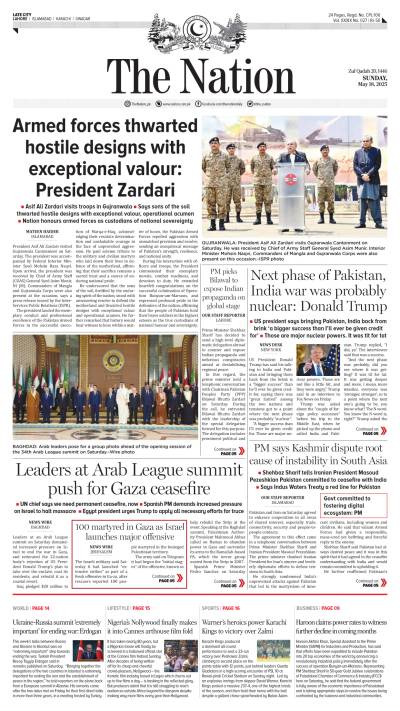The Governor of Balochistan levelled serious charges against the security agencies after the Kirani Road massacre. He said that they are either incompetent or afraid of acting against the terrorists. The observation about fear is really grave. It implies that they have the information about the terrorists, but are reluctant to act against them due to fear of retaliation; this hesitation may be politically-motivated. Whatever is the real cause of their failure, it is a serious accusation that tends to reduce their efficacy and peoples’ confidence in them.
This notion gets further credence from the reaction of the security forces after the blast. They were able to mount retaliatory raids and arrest the culprits in a short span of time. What it implies is that the agencies knew the culprits and their locations, but did not act earlier to save the lives and property of the victims. The fact that terrorist transported a huge quantity of explosives hidden in a “water tanker” through check posts and barriers undetected also raises suspicion.
However, those who are vocal about the prevailing political climate see these happenings as continuation of other events that are visibly linked to the holding of elections. They view these events as a collective move on the part of leaders, who have failed to deliver in the past five years and want to derail the electoral process; that they have little love for the masses and the country. This notion too is sapping people’s confidence in the system.
Some even maintain that the reaction of the government is geared to drawing political mileage only. There is no clear policy direction to deal with the terror threat. The imposition of Governor’s Rule, calls of joint sessions of Parliament, holdings of the APC and cabinet meetings or high-level parleys will have no effect, unless there is a clear-cut and bold policy that can be translated into action.
A critical overview of terrorist acts in Pakistan indicates that their intensity grew gradually. From sporadic suicide attacks on individuals, they have grown into well planned, coordinated large-scale bomb blasts at religious places, defence bases, government offices and security installations. This indicates that the extremists have attained professional maturity and have expert advice, training and financial support to get weapons.
It also indicates that there are powerful forces behind them and unless their support base is destroyed, they will not be eliminated. This calls for a joint and collective effort by all security agencies and a dedicated anti-terror organisation.
Past experience shows that our security agencies are ‘reactive’ in combating terrorism. They, perhaps, are not attuned designed to be “proactive’ or pre-emptive. They have been unable to detect terrorists’ movements and only react to them when an attack has been mounted; whereas, it seems that terrorists can move with complete safety all over the country and are able to transport large quantities of weapons and explosives undetected. Those who are responsible for the state’s defence should ponder over their failure and make themselves effective in combating the terror threat.
Historically speaking, our civil, military and inter-services intelligence agencies were established in the days when the focus of national security was elsewhere. The ISI, IB, integral military intelligence apparatuses had definite objectives for which they were organised and equipped and were effective. It is believed that their basic scope has not changed, though their activities did change according to the circumstances - they were upgraded or modified on ad-hoc basis only. The ISI got a boost during the US-sponsored anti-Soviet jihad in Afghanistan, and it claimed laurels and became all-encompassing in the public eye. But presently the international media and our adversaries have demonised it to the level that we expect miracles from it in the line of defence; it is capable of handling the given mandate but has limited capacity.
The Frontier Corps (FC) and rangers are being tasked to establish law and order despite the fact that they are border security forces to check smuggling and illegal border crossing. They are ‘not’ suited to do policing.
Undoubtedly, our successive military and political rulers have politicised these agencies to the extent that they have become inward-looking. Their efforts are mostly directed towards political opponents, government officials, higher judiciary and journalists. The Chief Justice earlier declared that the agencies tap judges’ telephones. The fact is that they are tasked this way by insecure and diffident leaders, who rise to power and try to hold on to it forever. They want their opponents in check and use the agencies for this purpose. This activity politicises the intelligence community to the extent that their focus shifts, affecting their efficiency and mandate.
Against this background there is a need to have a permanent and independent organisation with the aim of combating inland terrorism of all kinds. It is not an impracticable idea. We should have done that with the first terror act that was committed on Pakistani soil.
Immediately after the 9/11 incident, for instance, the US established Homeland Security by an Act of Congress, despite the availability of CIA, FBI, NSA and many other security agencies. Obviously, they lacked the ability to combat an unconventional enemy; Pakistani intelligence community has similar weaknesses.
We in Pakistan need a similar organisation that should be created by an Act of Parliament. It should be independent in operations and be answerable to Parliament directly. It should not be part of any political setup or ministry; otherwise, it too will be politicised and used for political witch-hunting.
The Act of Parliament should lay down its objectives, mandate, resources and its operational parameters. It should be provided lien on all intelligence agencies for data gathering and on security forces for troops to conduct operations. It is not an easy task; however, we should learn and seek assistance from the USA, if possible.
Terrorism is going to be a constant phenomenon for a long while and needs a permanent organisation. We are too late already. The way we are handling it is not going to be effective at all. If we fail, we will keep mourning our dead and the terrorists will keep striking us; today one community is targeted, in future it will be free-for-all putting the state at risk. We should act now and act fast.
The writer is a retired brigadier. Email: arjerral@hotmail.com
Sunday, May 18, 2025
A way out of terror mayhem
-
Lahore emerges among safest global cities in Numbeo 2025 index
-
Lahore emerges among safest global cities in Numbeo 2025 index
-
India’s suspension of Indus Water Treaty legally baseless
-
Seventh polio case reported in Pakistan amid nationwide vaccination drive
-
Pakistan reports sixth polio case of 2025
-
PTA begins issuing VPN licences to regulate usage
Culture Shift
May 18, 2025
Tactical Shift
May 18, 2025
Unmasked Cruelty
May 18, 2025
India Isolated
May 17, 2025
Descent into Hell
May 17, 2025
Fostering Entrepreneurship
May 18, 2025
Behind a Promising Job Offer
May 18, 2025
Indo-Pak Wisdom
May 18, 2025
Traffic Signal at Shahzad Town
May 18, 2025
English a Measure of Intelligence?
May 17, 2025
ePaper - Nawaiwaqt
Nawaiwaqt Group | Copyright © 2025





